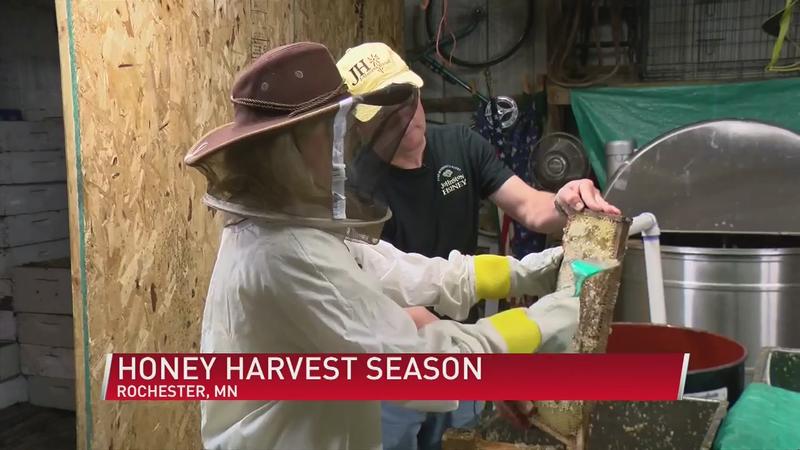Local honey harvest season begins
[anvplayer video=”5052062″ station=”998128″]
(ABC 6 NEWS) – There is a lot of buzz happening around Rochester, millions of bees that have produced honey since April and now the honey is ready to be harvested.
Tom Ownes took over Johnston Honey just 6 years ago from Don Johnston. This is their 24th season of harvesting season and it is huge.
"It’s an ongoing yearly process," said the Owner of Johnston Honey, Tom Owens.
Owens gets started in April by placing his bees in their honey boxes to create honeycombs and throughout the summer they produce honey.
"By the middle of August in that short time, they have produced about 120 pounds of honey per hive," said Owens.

Owens has eight farms in a 20-mile radius of Rochester. There is about 80 hives total. Over four days, they will harvest about 9,000 pounds of honey.
Owens and his team of workers start out by heating the honey boxes to make it easier to remove the honey from the honeycombs. They then decap the honeycomb to remove the wax and allow the honey to come out.
Once the wax is decapped, 48 frames of honeycomb get placed into a machine that spins the honey out into a barrel.
"It will take about 3 of these spins to produce about 600 pounds of honey," said Owens.
Once they finish harvest season, all of the barrels of honey go to their warehouse to be created into products.
It’s not just jars of honey, it’s also candles and chapstick, but behind all of this these bees are helping keep Minnesota’s pollination going.
"I’ve noticed a lot of improvement in how much food in that they have the prairie grassland which we try to focus on where our hives there is getting to be more of that so we are definitely helping that in Minnesota," said Owens.
There have been concerns over the past few years of the bee population declining and there has been legislation in Minnesota to try and help the problem. Owens said while his bees are fine, it is more about the wild bee population.
"All of our food is dependent on the bee population so if that ever gets to the point to where that is down to where it isn’t we could be in some real big trouble," said Owens. He added, "The food production would drastically decrease if the pollinators disappear."
Experts have said certain pesticides and not enough plants can be a part of the problem.